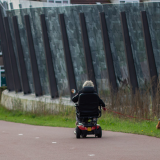
Közszolgáltatások
A közszolgáltatások ‒ például egészségügy, oktatás, szociális gondozás és közlekedés ‒ elengedhetetlenek a magas szintű szociális védelem, társadalmi kohézió és társadalmi befogadás megvalósításához. Ugyanakkor a szolgáltatások minősége és hozzáférhetősége határozza meg, hogy mennyire eredményesek a változó társadalmi és demográfiai környezetben.
A politikai döntéshozók számára az jelent kihívást, hogy biztosítsák a polgárok különböző igényeinek megfelelő egészségügyi és szociális szolgáltatások megtervezését és nyújtását. Ezt a kihívást az utóbbi években a növekvő kereslet mellett komoly pénzügyi megszorítások súlyosbították, amit részben a népesség elöregedése, részben pedig a menekültek Európába történő beáramlása idézett elő. A megfizethetőség és a minőség mellett újabb kérdések is felmerülnek. Ezek közé tartozik az a kockázat, hogy a szolgáltatásnyújtáshoz használt új digitális csatornák izolálhatják a már most is hátrányos helyzetben lévő közösségeket, valamint a szolgáltatások hozzáférés és minőség tekintetében a színvonal biztosításával összefüggő potenciális nehézségek.
A Bizottság által 2013-ban előterjesztett szociális beruházási csomagja arra ösztönzi a tagállamokat, hogy helyezzenek nagyobb hangsúlyt a magas színvonalú közszolgáltatásokra. Ezen túlmenően a Bizottság 2015-ben elfogadott európai digitális egységes piaci stratégiája kiemeli, hogy a közszolgáltatások korszerűsítése a versenyképesség fokozásának egyik módja. Az új technológiák felhasználása miatt költséghatékonyságának és minőségének javításában döntő szerepet játszanak az internetes közszolgáltatások. A Bizottság 2017. áprilisban előterjesztette a szociális jogok európai pillérére vonatkozó csomagot, amely a fontosabb alapelvek közül magában foglalja a magas színvonalú oktatáshoz, kisgyermekkori neveléshez és gondozáshoz, egészségügyi ellátáshoz, szociális lakáshoz és más alapvető szolgáltatásokhoz jutást.
- Európai Bizottság: Szociális beruházási csomag
- Európai Bizottság: Digitális egységes piac
- Európai Bizottság: A szociális jogok európai pillére




























